News
Synod 2009
Diocesan Synod 2009
Clogher Diocesan Synod was held on Thursday 24th September in Drumkeeran
Parish Hall, Tubrid near Kesh in North Fermanagh. The well attended Synod
welcomed representatives from the Methodist, Roman Catholic, and Presbyterian
Churches, who brought greetings to Synod. After the pre-Synod Service of
Holy Communion in Drumkeeran Parish Church, members and guests gathered
in the parish hall for the business of synod. The opening reading from Ephesians
was read by Mrs Stephanie Woods, an ordinand, and the opening prayers were
led by the Revd Precentor Dr William Johnston. The Assessor for synod was
Sir Anthony Hart.
In his address, entitled Identity and Community, the Rt Revd Dr Michael
Jackson, Bishop of Clogher, made reference to education in the Republic
of Ireland, the bishop stated that “this is an area where questions
of identity remain highly charged and impassioned. The sudden guillotining
of Free School status and the consequent withdrawal of the SEC grant at
the beginning of 2009 hit very hard at an agreement which had, since the
foundation of the State, enabled Protestant people to provide and to experience
education in accordance with the Protestant ethos. One fell administrative
swoop has cut at the root of this and the devastation of its impact raises
serious and on-going questions about respect for Protestant identity as
an interwoven component in national identity.”
Through his address the bishop appealed to Minister Batt O’Keeffe
TD “that there be a recognition that Protestant Secondary Schools
such as Monaghan Collegiate School, the oldest school in Clogher Diocese,
are not the fat cats of the system; that the provision of denominational
education carefully planned and honourably delivered is neither sectarian
nor politically incorrect; that the preparation for a life of active and
responsible citizenship which is offered in schools such as Monaghan Collegiate
School can and does proudly stand side by side with any other school in
the secondary sector in today’s Ireland. It is not our wish either
to prop up the past or to live in the past. It is our concern, in fulfilling
educational aspirations for the children and young people in our care, to
make through them an open-ended contribution to public life and active citizenship.
Our capacity to do so has been seriously endangered and needs to be safeguarded.”
Continuing on the subject of education, the bishop said “secondary
education in Northern Ireland has received a number of frustrating setbacks
over the year past. In County Fermanagh alone, Lisnaskea High School, celebrating
this year its fiftieth anniversary, still faces tremendous uncertainty about
its future; Devenish College is promised a new build on what remains a green
field site; Enniskillen Collegiate has long been promised a new Science
Block at least; Portora has also been promised a new build. In terms both
of estate and morale, this makes for a very reduced educational experience
for all pupils and teachers. Meanwhile, it also seems that the Department
of Education and the secondary schools are moving in opposite directions.
The danger inherent in this is anxiety and confusion for primary school
parents and pupils contemplating the future in their own schools and the
future in secondary education for such children.”
Within the Diocese, the bishop stated that “one of the interesting
developments in the year past has been the number of people who have wanted,
as members of the diocese, to go to the Holy Land as pilgrims. This initiative
was indeed well under way before Bishop Suheil came to spend Whitsunday
2008 with us but is greatly enhanced by our knowing him and his knowing
us. Not only did those who went on pilgrimage find it a transformative experience
personally, but a number of other things have flowed from this in the best
evangelical tradition. Theology and geography were brought together in the
person of Jesus. A number of really practical mission initiatives have come
out of this. When confronted by the unspeakable human tragedy in Gaza, which
occurred between the two pilgrimages, we were able to mobilize practical
support from the diocese and get it immediately through our contact with
Bishop Suheil directly to those in pain and need. Furthermore, we have been
able to offer support to a wider educational need in the Holy Land in the
form of support for a Diocesan School in Jordan. Our biggest initiative
now is that of providing significant support for St Luke’s Hospital,
Nablus through the Holy Land Medical Relief Fund.”
The bishop also thanked the “Jacaranda Farm Committee for their work.
Not only has Clogher Diocese contributed in Northern Nigeria to agriculture,
irrigation and a building programme, but Bishop Josiah and his wife, Comfort,
shared with those of us who met them on a visit to Clogher in June 2009.”
In concluding, the bishop said “as The Peace in Northern Ireland
gives us all an opportunity to rethink our own priorities in a climate freed
from much of the fear of the past, we need to go back, among other things,
to expressions of hope and nuggets of possibility as contained in, for example,
1 John 3.2: Dear friends, we are now God’s children; what we shall
be has not yet been disclosed, but we know that when Christ appears we shall
be like him, because we shall see him as he is. But the other side of this
is that he will see us as we are! And the challenge in this for us is that
by our conformation to Christ we are transformed into our best selves in
Christ and in community. The Kingdom of God – like a little child,
like a mustard seed, like so much else that could be disregarded and unknown
in everyday life then as now – breaks in on our world and gives us
a foretaste of being as we will become. Identity is wound into belonging
and belonging makes community. The call to make community begins in baptism
and continues in communion and mission. We are called as Christian adults
to rejoice and to delight in who we are and to yearn for the time when Christ’s
seeing us will blend with our seeing him. In the meantime, we are called
by the same Christ Jesus to put at the service of God’s creation the
precious gift which is ours through God’s grace, that of being a child
of God.”
During the other business of synod, the Revd Bryan Kerr and the Revd Maurice
Armstrong, along with Mr John Irvine and Mr Norman Hilliard were elected
as Honorary Secretaries, whilst Archdeacon Cecil Pringle was returned a
the clerical member of the Representative Church Body. The Report of the
Diocesan Council was proposed by the Revd Alan Capper and seconded by Mrs
Una Bourke. The Revd Chris Matchett and the Revd Bryan Kerr spoke to the
report of the Northern Diocesan Youth Council, and the Revd Robert Kingston
spoke to the report of the Southern Diocesan Youth Council.
The report of the Diocesan Board of Religious Education was proposed by
Mr Jim Kerr and seconded by Mr John Irvine, whilst the report of the Diocesan
Board of Mission was proposed by the Revd Robert Kingston and seconded by
the Revd Bryan Martin.
Canon Stanley Bourke spoke to the report of the Diocesan Ministry of Healing,
and the report of the Diocesan Glebes Committee was proposed by Mr Henry
Robinson and seconded by the Revd Helene Steed.
The excellent hospitality and evening tea afforded to Synod by the Parish
of Drumkeeran was appreciated much by all.
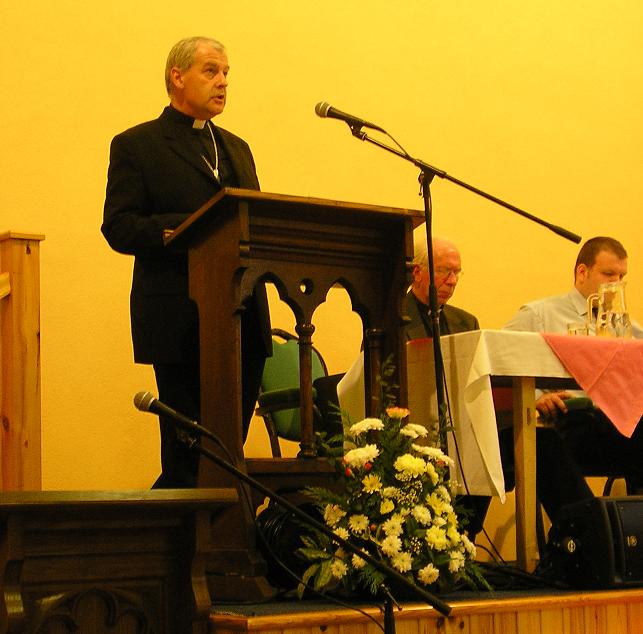
Bishop Jackson - Addressing Synod
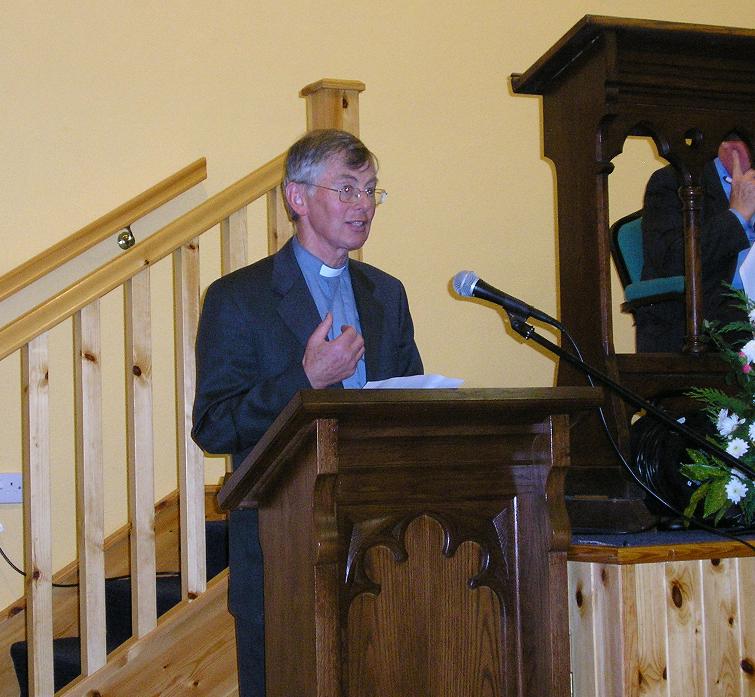
Canon Stanley Bourke - Proposing the report of the Diocesan Ministry of Healing
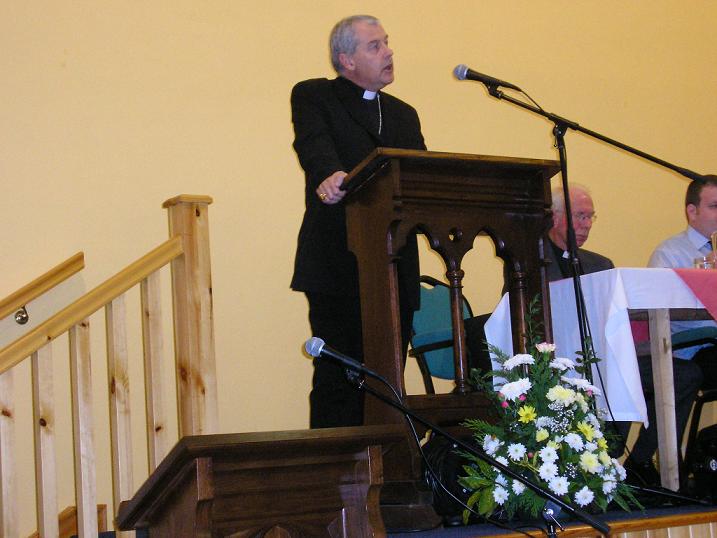
Bishop Jackson - Addressing Synod
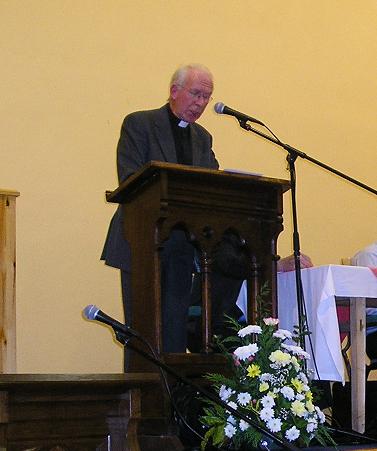
Archdeacon Pringle - Addressing Synod as member of the RCB
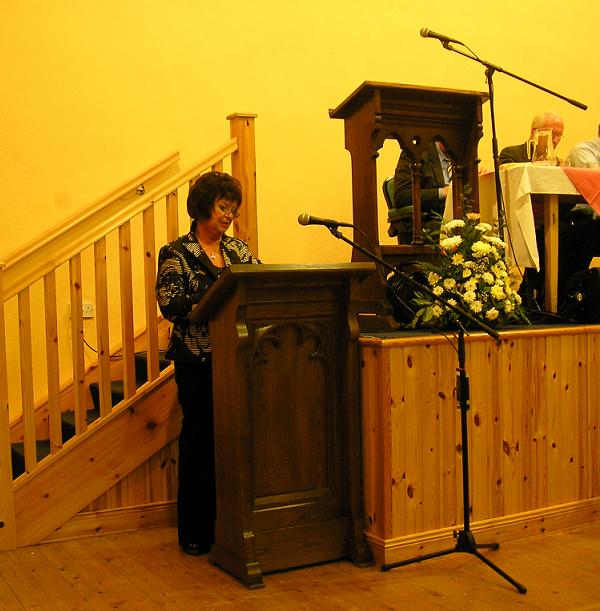
Mrs Una Bourke - Seconding the report of Diocesan Council
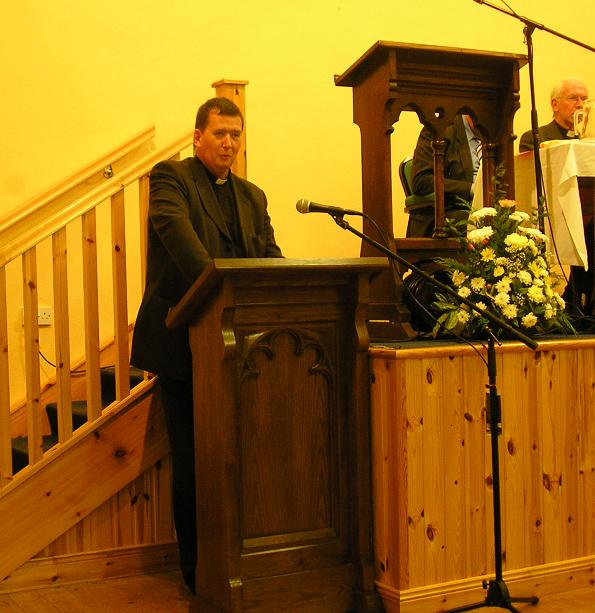
Revd Alan Capper - Proposing the report of Diocesan Council
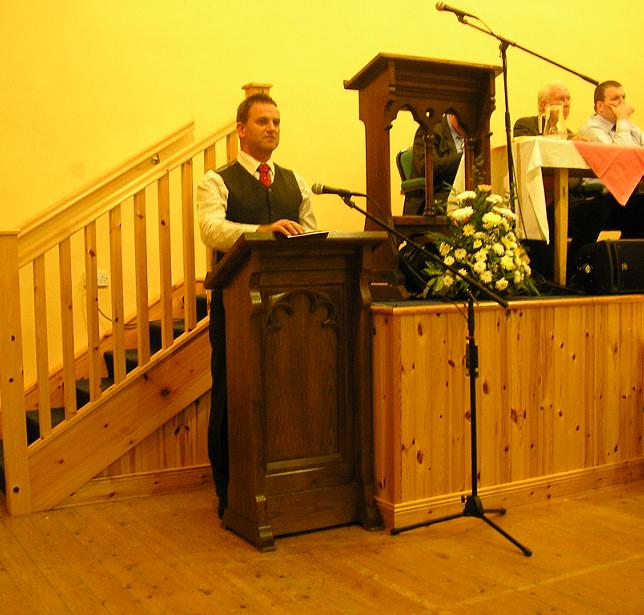
Mr Michael Hall - Synod member and Principle of Monaghan Collegiate School,
speaking about Education in the RoI
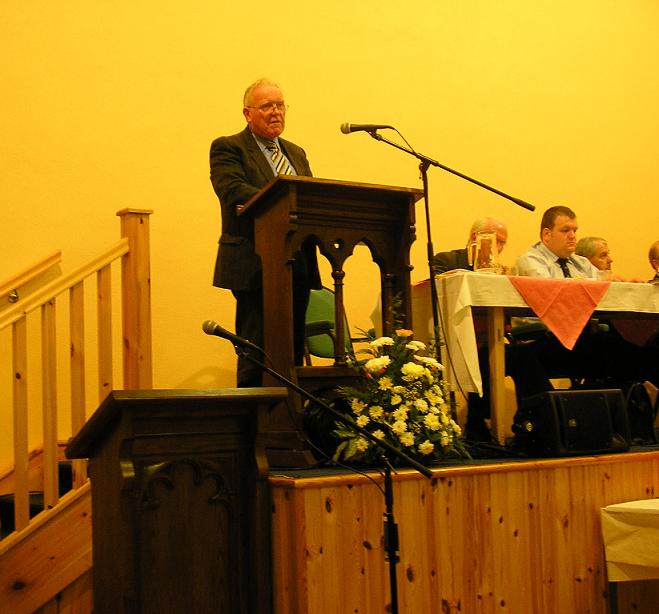
Mr John Irvine - seconding the report of Clogher Diocesan Board of Religious
Date:28th September 09